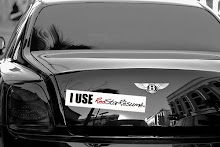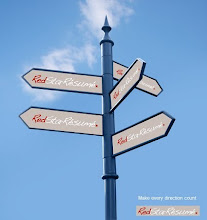 What is a dream job?
What is a dream job?
Do you know someone who has the dream job?
Is there really such a thing as a dream job ?RedStarResume posted this question on LinkedIN. Here are your answers:
“It depends on what is the basis of somebody defines his/her dream job.. Is it learning, Money, Foreign trips, Brand Name etc. etc.
According to me, its about identifying who you are, what your natural talents are and then getting into a job where you get to apply your talents on a day to day basis. In other words you have an opportunity to do best every day and you look forward to coming to work everyday.
Therefore, there is something which an Individual has to do to get a dream job (identifying what is he looking for and what talents he brings on table) and then there is something which Organizations have to do (identify the talent, put him in a right role and give him a great manager) and you might land into a dream job” - Ashish
“A dream job is one that makes you look forward for the Monday throughout the weekends, week after week, month after month & year after year” - Souri
“The phrase to ‘create a personally satisfying career path’ doesn’t sound as snappy but is probably more helpful. The idea of ‘finding your dream job’ makes several assumptions, each of which has it’s limitations:
1) There is only one job that would fit you – you may have many options and you can’t do them all
2) It already exists out there – you may have to invent it
3) You will stay the same forever – your priorities and talents will change over time
4) The job will stay the same forever – the nature of the job may change
Sometimes the biggest problem is not ‘finding’ the job but recognising it when you see it. As an afterthought. Some people talk about a dream job as being something that has personal meaning. The question remains. Do you find a job that already has meaning or do you try to find the meaning in your job?” - David
“There is potential in every job, to be a dream job? Well, I think so. Any job can be a dream job through your attitude, gratitude, and choice.
Are you a clerk at a bookstore? Are you a city garbage truck driver? or is it washing cars or fixing computers ? Maybe you love to mow people’s lawns. Well, there are no menial jobs; only menial attitudes. Choose a job you love and you’ll never have to work a day in your life and that is your dream job” – Abdul
“Walking to work with a big smile on your face on a Monday morning in anticipation of the day and week ahead is probably a good indicator. I also think that the challenge once you’ve found it is to continue to appreciate it, to be able to walk away from it on a Friday or in the evenings and not to covet it too much. Otherwise the ‘Dream Job ‘ may be fleeting” – Richard
“A dream job is one that you’ll do even if you’re not paid for it” -Y.K.
“A dream job is one in which you are able to utilize your talents in meaningful ways, participate in activities that serve others and your higher self, and compensation becomes a byproduct of personal reward and satisfaction. Many people are fortunate enough to work in situations that inspire passion and growth in themselves and others. Learn what makes your heart sing and pursue it relentlessly” - Monica
“This depends on your definition of the “Dream Job.” If you mean perfect in every way, obviously no one has this type of job.
However, if you mean a job that has its hiccups along the way, but offers job satisfaction, self-fulfilment, the opportunity for advancement, the potential for increasing salary–the “Dream Job” certainly exists. My father once told me he had the best job in the world. He was teaching at a renowned university. He loved teaching. But he was also doing research and grant writing, and bringing in a lot of money for the university. He had the freedom to coach my baseball teams and attend any of our games. The money wasn’t great, but that increased over time.
With realistic expectations, the “Dream Job” exists. It is not perfect, just as dreams are not perfect. I suppose a job without its problems would be boring and lack challenge” – Bob
“Absolutely!!!! It is when your passion, lifestyle, and abilities come together. I happen to have had several dream jobs” - Robin
“I had the pleasure some years ago to be driven at high speed around a race track by a professional racing driver.
Talking to him afterwards I said that he must have found his “dream job” or words to that effect.
He replied “It’s not bad but I really wanted to be a porn star!”
Some people are never happy – funny old world isn’t it! “ – John
“NO! You can have a job you enjoy, however keep in mind that a job is a job. There are things that you are not in control of when it comes to a job like keeping it or the attitude of your superiors. I would say the best situation you can be in is if you work for yourself” - Jeff
“The dream job is the one you really like to do, matching exactly with your competences, your capabilities and your expectation, the one where you will face challenges, bringing you from competence to excellence, the one where you can give the best you can do, source of blooming and happiness” – Eric
“No, there aren’t any dream jobs. There are jobs that you live to do, that you can’t wait to do. But even with that type of passion, every job has its negatives. Co-workers you don’t get along with, managers, who don’t see eye to eye with you, too long hours, too little pay, and the possibility that your job will be eliminated or outsourced. If you enjoy what you do and are eager to come to the office in the morning, that’s pretty special even if it’s not perfect” – Darlene
“A dream always remains a dream. I wanted to be an artist but end up selling photo albums and in the printing industry. I have a dream about a girl I love when young, but gain it was a dream. Wild and silly dream like wanted to be John Travolta….but never happen….anyway, dreams keep me going” – Daniel
“I think there are “dream roles” that you can envision as you grow and develop over your career. These tend to involve greater scope, stretching, and drawing on a different basket of skills that you want to strengthen. The goal is always elusive though, as you quickly grow into whatever dream role you eventually land, and it gets replaced with a new dream. To paraphrase Browning, a person’s reach should always exceed their grasp…
PS. I have had some amazing jobs but NEVER ONCE have I woken up first thing on a Monday wanting to do anything other than go back to sleep!” – Rob
“I think there are as many “dream jobs” as there are people in the world! I believe there are a lot of elements that come into play when somebody defines their dream job. They are in the right environment, with the right people, using the their strengths, compensating for weakness, doing the right things, achieving the right goals, etc…
A seemingly simplistic view of a dream job might be when your life’s mission or purpose is fulfilled in the job you do. That’s certainly been the case for me and I am living my dream job!” – Shellie
“Yes, Dream Jobs Do Exist! But the definition of a dream job is different for each one of us.
I understand where some of the previous responders are coming from, referring to the fact that a “job” can’t be compared to or labelled in the dream category.
However, in the context of having a job, I have met many people who have described their experiences as “Dream Jobs.” There are people out there, my sister for instance, who are absolutely passionate about what they do and are living out their dream doing it – she is a Chief Nursing Officer and is dedicated to excellence in patient care and the professional development of nurses.
This is not to say that dream jobs aren’t full of challenge and bad days. Most jobs are.
Having a dream job does not mean your job is perfect. It just means it is exactly what you want to be doing, and for whatever reason, you find the ultimate satisfaction in doing it, whether this be through intrinsic rewards, professional or social benefits, monetary rewards, etc – you are living your dream job”
I hope you find yours!
Marjorie
“Does a nightmare qualify as a dream??? I always try to keep in mind that any company with a career opportunity created that opportunity for a reason. The company more often than not is looking for some one to step up to a major challenge. If you are dreaming of being able to leap tall buildings in a single bound, then you can have your dream job” - Kenneth
“Sorry to put a bit of a damper on this discussion, but at some point those of us engaged in job search have to be realistic and make the best of what we can get” - Judy
“A dream job is just a job that you look forward to going to. A job that makes you happy, it doesn’t have to be something outlandish or farfetched. And as for dreams go, once those die then we’re going to have issues” - Dexter
“Absolutely they exist! I have it – I LOVE going to work, love where I work and my job duties are well suited to my talents and personality! I encourage everyone to find this type of position where they are appreciated and can grow” Wendy
“Many people would like to find their “dream job”. But whether they are able to find it or not is finally the outcome and what defines the existence of a “dream job”.
If people have the talent to turn their dreams into reality – then yes, they are able to find their “dream job”. If they are not able to do so, then they keep searching and some find it successful, some not and the cycle continues.
WHAT IS A DREAM JOB
Basically, there is no such thing that is lying out there in the world as a qualified, identified entity that could be called as a “dream job”. Its all in the perspective and thoughts of the person searching for such an opportunity.
JOB SEEKER PART
If people believe and wish to attain something then its up to them to find out whether they are eligible and capable of achieving it, in the first place – in terms of everything like expertise, experience, skills, etc. And, if they do not possess any or all of such things, whether they can learn, improve, acquire such things. Once they feel eligible, they can start looking for it – BUT HERE IS THE CATCH – they should be clear on what they are looking for and they should search in the right place at the right time thru the right means, clarity is critical. If not, they have to keep searching and whether they will get it or not is a question.
Above all, the core skills or “life skills” or “soft skills” like communication, presentation, personality related, leadership skills come in to play apart from the job related skills and technical skills. If people possess such skills and talent, if they are able to attain that particular position/title/level in job or career then they feel they are in that “dream job” – that dream is a reality.
DREAM JOB – HOW TO MAKE IT A REALITY
But yes, dreams can be turned into reality and it all depends on the person, but not necessarily all in a particular time frame expected – that’s the most important, what really matters whether there is a time factor attached to it – to convert that dream or goal or objective into reality. Only such time factor associated clear goals have chances of becoming a reality. So that dream has to be a goal, and that goal has to be associated with time, and this should have proper plans and means in place – then yes, this dream job can become a reality” - Venkdesh
© RedStarResume Publications –
www.redstarresume.com


















